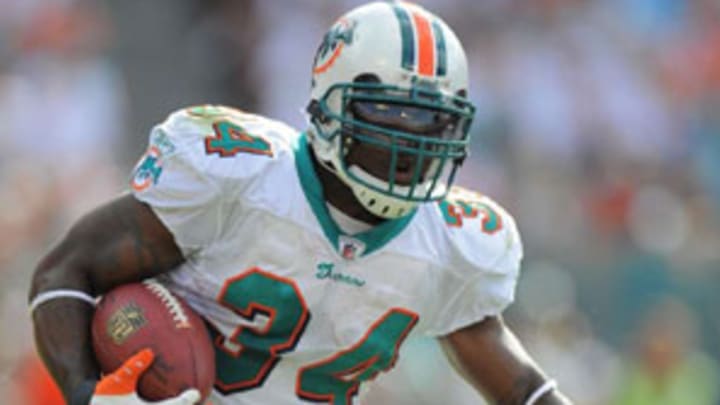Mercurial Ricky Williams makes the most of his second act


A Ricky Williams story: On May 21, his 32nd birthday, Williams was stretching with teammates before practice. Dolphins football czar Bill Parcells handed him a yellow, folded-up Post-it note.
"Tell me what you think,'' Parcells said, walking on.
Williams glanced quickly at the note, but it wasn't until later after practice that he unfolded it and weighed its minimalist message: "2010 -- $4.35 million."
That's how Williams got a contract extension. No agent. No demand. No haggling. No media. No silliness. No announcement. Nothing but one old pro showing an appreciation for another old pro.
Oh, and happy birthday, Ricky.
But here's the question: Does that change anything? Does it make you see Williams through a new prism? Does it matter that an old-school, closed-fisted hardliner like Parcells, who left New England owner Bob Kraft over shopping for the groceries and bolted Dallas without calling Terrell Owens by name, not only has embraced Williams but extended him?
Well?
Because here's the latest surprise about Ricky: There's a second act to him. No one generally stays on the football stage long enough for a second act. They get hurt. They get replaced. They age in dog years -- one NFL year equaling seven human years.
But Williams not only has survived. He's grown. He's respected in a franchise that mocked him five years ago. He's even considered -- are you ready for this? -- "a pro's pro," as Dolphins coach Tony Sparano said recently.
All this might surprise you, or just make you wonder what the Dolphins are smoking. That starts with the fan at Miami's final preseason game in New Orleans who shouted, "Hey, Ricky! Will you sign my pipe?"
Williams heard that. He hears it all. He goes to a party and he hears people asking to smoke with him. He pulls up the Internet and sees a picture of him carrying a joint instead of a football. He also heard a fan, at another preseason game at Tampa Bay, shout, "Will you smoke my peace pipe?"
He laughed at that. At least it showed some imagination. But this fan in New Orleans, the one asking him to autograph a pipe, only made him sag a bit and ask: "Is this ever going to end?"
Truth is, it's hard to field a starting basketball lineup with players who have done a U-turn on troubled reputations. Cris Carter. Irving Fryar. Tim Raines. Kobe Bryant. Josh Hamilton.
Williams doesn't run from his part in this. He made mistakes. They're all documented. He also fled to Australia upon leaving the Dolphins in 2004 and let others fill the vacuum with bile and cross-talk. But it's been three years and more than 1,000 drug tests since his last slip and if you don't see a different Ricky it's because he's not in the crosshairs anymore.
Last season, while working toward his college degree, Williams even wrote an English paper on the importance of obedience. You're allowed to smile given the man's flunked five drug tests. Williams smiles, too. But a writer's supposed to write on a subject he's come to know.
"I can look at my situation now and say I benefited from being punished,'' Williams said. "It was hard for me to see that sometimes. But if I hadn't been punished, I'd be in a destructive situation right now. I'm leading a much more peaceful life because of it."
The shame in all this is Williams' stick-figure image the last several years as, "some poster child for marijuana,'' as he says, won't let anyone see beyond to his full personality.
He has a master plan to study osteopathy. He took classes last offseason toward a massage license. In just the past two weeks, he got married to his longtime girlfriend on a Fort Lauderdale beach, enrolled in an algebra class as a step to get his college degree, worked on a documentary about himself that he's funded for several years and, oh, yeah, scored the lone Dolphins touchdown in their season-opening loss to Atlanta.
At times, Williams sounds like Red in Shawshank Redemption telling the parole officer he wants to talk some sense to the young, stupid kid he once was.
"I wish there was someone who would've been a good mentor for me,'' he says. "I wish someone was there to help me through some things."
At other times, he sounds like a dinosaur for the kind of talent he brings.
"If you look at the NFL today, there aren't a lot of running backs who run downhill into people,'' he said. "You've got guys trying to make people miss. I feel I'm still physical. I'm still explosive. I just have to work at it more."
Mostly, he's sounds like someone who appreciates where he's been and now is. He's no longer the young, talented kid who led the NFL in rushing in 2002. Nor is he the young, scared kid who felt his body being Earl Campbell-ized by carrying the ball nearly 400 times in both 2002 and 2003.
But he's still a productive guy to share the load. He's sets an example of professionalism on a team. He's the kind of player you can win with in the NFL.
You don't have to believe that, if you're locked into the headlines of a few years back.
But Parcells does.
